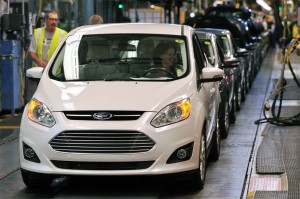Already one of the most ambitious players in the battery-based vehicle market, Ford Motor Co. wants to take a run at hybrid market leader Toyota with a new gasoline-electric model it will launch in 2018, according to a new report.
The as yet-unnamed model will be directly targeted at the Toyota Prius, the world’s most popular hybrid-electric vehicle, and will use a dedicated design, unlike other Ford hybrids that are pitched as optional alternatives in conventional vehicles.
A report by the Reuters news service says the new model will be produced in a plant near Detroit, likely the factory in Wayne, Michigan that currently produces a mix of other Ford battery-cars, including the Focus EV, and the C-Max, which is offered in both hybrid and plug-in hybrid configurations in the U.S.
Ford, like competitors domestic and foreign, has been frustrated in its attempts to catch up to the Toyota Prius, which generated sales of more than 400,000 vehicles last year. It was the number one car in Japan overall and has been at or near the top of the sales charts in enviro-friendly California, as well. And though demand in the U.S. has slipped a bit this year, Toyota still sold 127,776 Prius-badged models – including variants such as the C and V, as well as the original hatchback – through the end of July.

A Ford C-Max Hybrid rolls off the line at the Michigan Assembly Plant. Sales are off sharply this year.
Industry analysts point to a variety of factors to explain Toyota’s success. The Prius has remained one of the more affordable electrified vehicles, and has built a solid reputation based off Toyota’s own image for solid reliability. But the line, especially the original model, appears to have benefited from a distinct body style unique from any other Toyota product and readily recognizable rolling down the street.
(Automakers power up on solar. Click Here for the story.)
That approach is a bit more costly, since Toyota can’t share many of the underlying components with other product lines, a reason why other makers have generally preferred to simply offer hybrid powertrains as options for other, more conventional model lines – such as the midsize Ford Fusion.
Honda has gone with unique hybrid models, starting with the original Insight 2-seater launched in 1999, the same year as the Prius. The smaller Japanese maker has had less success, though industry analysts say that is more a factor of problems with Honda hybrid technology than anything to do with vehicle design.
(New Sport Hybrid gives much-needed muscle to Honda CR-Z hybrid. Click Here to check it out.)
The new Ford, codenamed C240, will debut as a 2019 model, according to Reuters, and would launch about three years after Toyota launches its next-generation Prius, a debut expected next year. Toyota has dropped hints that it plans some major changes to the 2016 hybrid, including a more sporty design and improved performance.
Ford is also expected to launch several different versions of its planned hybrid model, mimicking Toyota’s approach which allows buyers to get into the smaller of the popular offerings, the base Prius C, for less than $20,000.
Ford is hoping to sell as many as 120,000 of the new hybrids annually, which would be a significant increase from its current hybrid sales, though still well behind Toyota.
Ford officials declined comment on the report.
(Chevy planning to reveal all-new Volt plug-in hybrid at 2015 Detroit Auto Show. Click Here for a preview.)
Whether the market is ready for another high-volume hybrid remains to be seen. The Prius saw U.S. demand drop 11% for the first seven months of the year, despite the overall revival of the American automotive market.
Adding up hybrids, plug-ins and pure battery-electric vehicles, the entire battery-based vehicle segment is less than 5% of the overall U.S. new car market, and demand has failed to keep pace with the rush of new products to market. Ford has seen a 24% jump in sales of its Fusion Hybrid, but at just over 31,000, that model accounts for barely one in every six Fusion sales. And the maker’s C-Max hybrid has seen volumes slide 29% so far this year.


I remember Billy making the grand statement that they were going to sell 250,000 hybrid escapes. Shortly after they were sued by Toyota for patent infringement and lost.
Ford’s better idea? If you don’t have any, just steal them.
Green Zone looks to be a new concept with a lot of potential. Seems a natural evolution of existing technologies with new to achieve niche, but still significant, efficiences and conveniences. Could give Ford a significant market edge.
Go Detroit!
It seems obvious to me that with IC engines running at only about 35% efficiency, THAT is where we will get our biggest gains. We need to figure out how to scrub every last BTU of energy out of the fuel we use to power our vehicles… and nation, for that matter. Even large power plants end up not much better than that.
Find a way to convert 95% of the energy into mechanical power, and we automatically achieve 3 times as many miles per gallon. The Average SUV is suddenly getting 45 miles per gallon! A VW Passat TDI, a very respectably sized sedan, is then getting an astounding 130! (I know, I own a 2014, and over its now 23,000 miles, it has AVERAGED overall just short of 45, and that’s with 4 passengers and all their stuff in it most of the time, and we’re not driving any differently at all). If I could get that with a Suburban, I’d trade in a heartbeat!
“Shortly after they were sued by Toyota for patent infringement and lost.”
Citation, please? Google reveals nothing